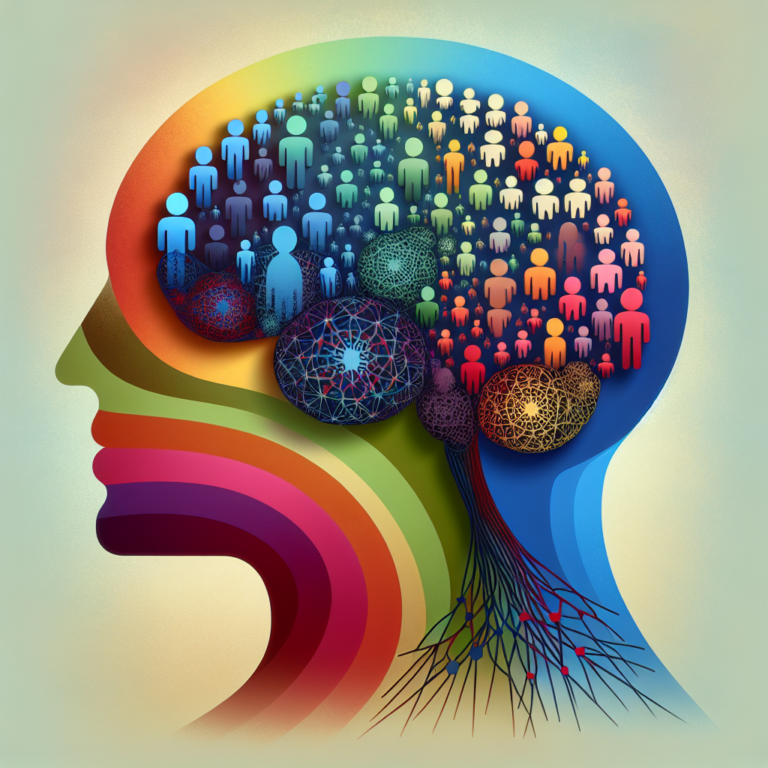
Introduction
Menopause is a natural transition in a woman’s life, yet it often comes with a range of mental and physical challenges, chief among them being menopausal anxiety. This anxiety can lead to feelings of isolation, mood swings, and intense worry about the future, profoundly affecting women’s quality of life. As we explore Empowering Women: Strategies for Managing Menopausal Anxiety, it is essential to provide actionable insights that can help women navigate this complex phase with confidence and grace.
In this article, we will delve into effective strategies, real-world case studies, and practical tips that aim to empower women, fostering a sense of control and well-being during menopause.
Understanding Menopausal Anxiety
What is Menopausal Anxiety?
Menopausal anxiety refers to the feelings of fear, worry, or unease that many women experience during menopause. This phase typically occurs between ages 45 and 55, often characterized by hormonal fluctuations, particularly in estrogen and progesterone levels. Such changes can trigger various emotional responses, making understanding and managing anxiety crucial.
The Hormonal Connection
Research indicates that hormonal shifts can profoundly influence mood and anxiety levels. Estrogen impacts serotonin production, a key neurotransmitter that regulates mood. Thus, declining estrogen levels during menopause can lead to increased anxiety.
Statistical Overview
A recent study found that approximately 25% of women experience significant anxiety during menopause. Understanding this statistic is the first step in recognizing that, while this experience may feel isolating, it is fundamentally a shared journey.
| Age Group | Percentage Experiencing Anxiety |
|---|---|
| 40-45 | 15% |
| 45-50 | 30% |
| 51-55 | 25% |
Empowering Women: Understanding the Impact
Physical Manifestations of Anxiety
Menopausal anxiety can manifest physically, leading to symptoms such as:
- Tightness in the chest
- Increased heart rate
- Sleep disturbances
- Fatigue
These physical symptoms can further exacerbate feelings of anxiety, creating a cycle that is challenging to break.
Emotional Toll
The emotional impact of menopausal anxiety is profound. It can lead to:
- Increased feelings of irritability
- Heightened sensitivity to stress
- A sense of losing control over one’s life
Understanding these effects is crucial for empowerment as it validates the experiences many women face.
Strategies for Managing Menopausal Anxiety
1. Mindfulness and Meditation
One of the most potent tools in managing anxiety is mindfulness. Mindfulness practices, including meditation, can help ground women during moments of anxiety.
Case Study: Sarah’s Journey
Sarah, a 52-year-old woman, found relief through mindfulness. After incorporating a daily meditation routine, she reported a significant decrease in anxiety levels and improved overall well-being. By focusing on breath and presence, she felt more in control of her thoughts.
2. Physical Activity
Regular physical activity is known to release endorphins, which can help combat anxiety. Activities can include:
- Walking
- Yoga
- Dancing
Case Study: Linda’s Transformation
Linda, 49, created a habit of walking every morning. Over six months, she experienced reduced anxiety and improved sleep quality. The consistency of her routine empowered her, giving her both mental and physical benefits.
3. Nutrition and Diet
A well-balanced diet rich in whole foods can positively affect mood and overall well-being. Omega-3 fatty acids, for example, are known to support mental health.
| Food Type | Benefits |
|---|---|
| Leafy Greens | Rich in antioxidants |
| Fatty Fish | High in Omega-3 |
| Whole Grains | Stabilize blood sugar levels |
4. Professional Support
Seeking professional help, whether through therapy or counseling, can provide women with tailored strategies to manage anxiety. Cognitive Behavioral Therapy (CBT) is particularly effective for anxiety disorders.
5. Building a Support Network
Establishing and maintaining a support network can be invaluable. Connecting with friends, family, or support groups can provide the empathy and understanding needed during this transition.
Case Study: The Power of Community
During a local workshop, several women shared their experiences with menopausal anxiety. One participant, Karen, emphasized how discussing her feelings with others made her feel less alone, proving that community support can be a vital component in managing anxiety.
Insightful Tools and Resources
Apps for Mental Health
Several apps offer guided meditations, mindfulness exercises, and community support. Popular choices include:
- Headspace
- Calm
- Insight Timer
Books and Guides
Reading can also be an empowering strategy. Consider:
- "The Wisdom of Menopause" by Christiane Northrup
- "Women’s Bodies, Women’s Wisdom" also by Northrup
Both offer insights that resonate with many women experiencing menopausal anxiety.
FAQs
1. Is it normal to feel anxious during menopause?
Yes, it is commonplace for women to experience anxiety due to hormonal changes during menopause.
2. How long does menopausal anxiety last?
The duration of menopausal anxiety varies by individual, often lasting through the perimenopausal phase and subsiding post-menopause.
3. Can dietary changes affect anxiety levels?
Absolutely! A balanced diet rich in nutrients can contribute to improved mental well-being.
4. When should I seek professional help?
If anxiety interferes with daily activities or becomes overwhelming, seeking professional assistance is advised.
5. Are there alternative therapies for menopausal anxiety?
Yes, therapies such as acupuncture, yoga, and herbal supplements may offer relief, but always consult a healthcare provider first.
Conclusion
In navigating the complexities of menopause, women must understand that they are not alone in their struggles with anxiety. By adopting Empowering Women: Strategies for Managing Menopausal Anxiety, individuals can foster resilience and confidence as they transition through this pivotal life stage.
From mindfulness and physical activity to professional support and dietary adjustments, these strategies not only help mitigate anxiety but also empower women to take charge of their health and well-being. Remember, menopause is a natural phase of life, and with the right tools and support, women can emerge stronger and more self-assured.
By embracing community support and adopting these strategies, women are certainly on a path to not only manage menopausal anxiety but to thrive during this transformative period of life.
Related Keywords for SEO
- Managing Menopausal Anxiety Naturally
- Coping with Menopausal Symptoms
- Menopause Support Strategies
- Anxiety Relief for Women in Menopause
- Overcoming Menopausal Challenges
This comprehensive approach not only aids in the direct management of menopausal anxiety but also serves to empower women, celebrating their strength and resilience as they navigate this significant chapter in their lives.















I believe this is among the so much important information for me. And i am happy studying your article. But wanna remark on some basic issues, The website style is ideal, the articles is truly excellent : D. Just right activity, cheers
Hey! I know this is kind of off topic but I was wondering if you knew where I could get a captcha plugin for my comment form? I’m using the same blog platform as yours and I’m having difficulty finding one? Thanks a lot!
I was recommended this website by my cousin. I’m not sure whether this post is written by him as nobody else know such detailed about my problem. You’re incredible! Thanks!
Unquestionably imagine that that you said. Your favorite reason appeared to be on the net the easiest thing to bear in mind of. I say to you, I definitely get annoyed whilst folks think about issues that they just do not recognise about. You managed to hit the nail upon the highest as well as outlined out the entire thing without having side effect , other people could take a signal. Will likely be again to get more. Thank you
I reckon something really special in this website .
Thank you so much for giving everyone an extremely nice chance to read articles and blog posts from here. It really is so pleasant and packed with amusement for me and my office peers to visit the blog really thrice in a week to see the new stuff you have got. Not to mention, I’m so actually contented with all the exceptional hints you give. Selected 2 points in this posting are undoubtedly the most efficient we have had.
Does your blog have a contact page? I’m having a tough time locating it but, I’d like to send you an e-mail. I’ve got some suggestions for your blog you might be interested in hearing. Either way, great website and I look forward to seeing it expand over time.
Some times its a pain in the ass to read what people wrote but this site is real user pleasant! .
Hello There. I found your weblog the use of msn. This is a really well written article. I’ll make sure to bookmark it and come back to read extra of your helpful information. Thanks for the post. I’ll definitely comeback.
I want assembling utile info, this post has got me even more info! .
Good write-up, I am regular visitor of one’s website, maintain up the excellent operate, and It is going to be a regular visitor for a lengthy time.
of course like your website but you have to check the spelling on several of your posts. Many of them are rife with spelling issues and I find it very bothersome to tell the reality on the other hand I will certainly come again again.
I think this internet site has very excellent indited written content content.
Attractive component of content. I simply stumbled upon your site and in accession capital to claim that I acquire actually enjoyed account your weblog posts. Anyway I’ll be subscribing in your augment or even I success you get entry to consistently rapidly.
I am continuously invstigating online for articles that can facilitate me. Thank you!
Everything is very open and very clear explanation of issues. was truly information. Your website is very useful. Thanks for sharing.
I went over this web site and I think you have a lot of good information, saved to favorites (:.
Thankyou for this terrific post, I am glad I observed this site on yahoo.
Hi, i think that i saw you visited my website thus i came to “return the favor”.I’m attempting to find things to improve my website!I suppose its ok to use a few of your ideas!!
It¦s really a cool and helpful piece of info. I am glad that you just shared this useful info with us. Please keep us informed like this. Thank you for sharing.
WONDERFUL Post.thanks for share..extra wait .. …
I love your writing style really enjoying this site.
Very nice article and straight to the point. I don’t know if this is really the best place to ask but do you guys have any ideea where to employ some professional writers? Thx 🙂
Very interesting topic, regards for putting up. “The reason people sweat is so they won’t catch fire when making love.” by Don Rose.
I like this post, enjoyed this one appreciate it for posting.
Great blog! I am loving it!! Will come back again. I am taking your feeds also
so much excellent info on here, : D.
Hello my loved one! I wish to say that this post is awesome, nice written and come with approximately all important infos. I would like to look extra posts like this .
Keep working ,fantastic job!
Outstanding post, you have pointed out some good points, I besides believe this s a very superb website.
I like what you guys are up also. Such clever work and reporting! Keep up the excellent works guys I have incorporated you guys to my blogroll. I think it will improve the value of my site 🙂
I will right away seize your rss as I can not in finding your e-mail subscription hyperlink or newsletter service. Do you have any? Kindly allow me realize so that I may just subscribe. Thanks.
I absolutely love your blog and find almost all of your post’s to be exactly I’m looking for. Do you offer guest writers to write content for you personally? I wouldn’t mind composing a post or elaborating on most of the subjects you write concerning here. Again, awesome site!
I dugg some of you post as I thought they were very beneficial very helpful
But wanna say that this is very useful, Thanks for taking your time to write this.
Hi there would you mind stating which blog platform you’re using? I’m planning to start my own blog in the near future but I’m having a tough time selecting between BlogEngine/Wordpress/B2evolution and Drupal. The reason I ask is because your design and style seems different then most blogs and I’m looking for something completely unique. P.S Sorry for getting off-topic but I had to ask!
Thanks for your personal marvelous posting! I genuinely enjoyed reading it, you may be a great author.I will remember to bookmark your blog and will often come back later in life. I want to encourage continue your great writing, have a nice evening!
F*ckin¦ awesome things here. I am very happy to peer your article. Thanks so much and i am taking a look forward to touch you. Will you kindly drop me a e-mail?
It?¦s actually a cool and helpful piece of info. I am glad that you simply shared this useful info with us. Please keep us up to date like this. Thanks for sharing.
Its excellent as your other content : D, regards for posting. “Talent does what it can genius does what it must.” by Edward George Bulwer-Lytton.
I am continuously looking online for posts that can aid me. Thanks!
Hello! I could have sworn I’ve been to this blog before but after browsing through some of the post I realized it’s new to me. Anyways, I’m definitely happy I found it and I’ll be book-marking and checking back frequently!
I would like to thnkx for the efforts you have put in writing this blog. I am hoping the same high-grade blog post from you in the upcoming as well. In fact your creative writing abilities has inspired me to get my own blog now. Really the blogging is spreading its wings quickly. Your write up is a good example of it.
Hi, I think your site might be having browser compatibility issues. When I look at your website in Safari, it looks fine but when opening in Internet Explorer, it has some overlapping. I just wanted to give you a quick heads up! Other then that, fantastic blog!
Hello! I just wanted to ask if you ever have any issues with hackers? My last blog (wordpress) was hacked and I ended up losing many months of hard work due to no data backup. Do you have any methods to prevent hackers?
Really informative and superb bodily structure of subject matter, now that’s user genial (:.
I’ve recently started a web site, the info you offer on this web site has helped me tremendously. Thanks for all of your time & work. “Yield not to evils, but attack all the more boldly.” by Virgil.